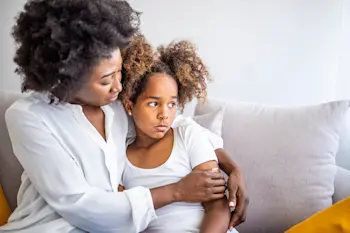How to talk to your children about conflict and war

When children hear about war and conflict on the news it can be upsetting for them. It can also be difficult to explain war to children while providing reassurance to them.
In this blog you will find tips to support and comfort your child during times of conflict.
8 small steps to support your child when talking about war
Find ideas on how to explain war to a child…
Find a good time to talk about the news
At dinner, in the car or during a walk can be a good time to talk when other distractions are minimised. Try to avoid conversations at bedtime (even though we know this is all children’s favourite time to talk as a tactic to avoid sleep!)
Ask your child what they know and how they are feeling
This will help you to understand what information they have picked up from friends, school or online.
Do they have any questions they would like to ask you?
You can explain that you might not know all the answers but you’ll do your best to answer honestly. Some children might seem unconcerned or not want to talk about it and that’s okay. It’s best to only give information that they are seeking rather than overwhelm them.
Reassure them
Talk about what people are doing all over the world to try and stop the conflict. When countries are in conflict, show them on a map where those countries are.
Talk about ways you might help
There are so many wonderful acts of human kindness going on to tell your children about. How would they like to help? You might collect some items to donate, give some money to the Red Cross or the DEC, talk about what you would do if a refugee needed a home. Seek out some positive news stories to share with them.
Make home feel safe
As much as possible keep life ‘normal’ for your child. Routine and home comforts really help children’s stress levels. Focusing on the present moment is healthiest for all of our wellbeing. Limit the amount of time you spend watching the news and be aware of discussing it within earshot of your children.
Look after you
Your child will always look first to you as to how they should respond to something. Try to absorb any news first without them present so that you can process your immediate reactions and give yourself time to translate any important information in a calm way. You’ve got this.
Additional useful resources
For more hints and tips check out some of these trusted guides and news sources.
Explore Learning have also developed many free resources that can support your family with wellbeing tips in addition to educational resources.
We are here to support you on this journey to raise confident, happy children.




